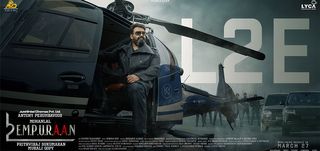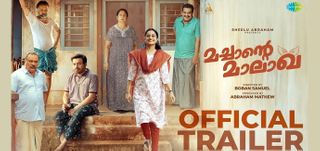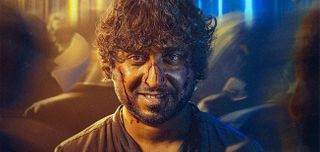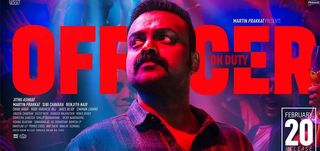
Kerala Cafe Movie Review
There has been a plethora of movies in the world that string together a series of related, and at times unrelated tales together, to form a resplendent whole. Kerala Café is one such attempt in Malayalam films, a maiden one perhaps, that strategically places ten shorts around a railway Café, linking them together in subtle ways, and juxtaposing major issues as love, betrayal and calamity with apparently unconnected ones as black magic, the global economic meltdown and senility.
Kerala Café starts off with a prologue by Sathyan Anthikkadu, who confesses that he's there to clarify those lingering doubts that he believes exist within our minds regarding the plot of the film. He assures us that the stories would be as different as they possibly could be, and makes an exit. There seems to be no obvious reason for him to be there, nor for the preface. Almost akin to the author scribbling down on his opening page what he wants his readers to expect and not to expect, this is a shaky start to an otherwise fantastic experiment.
Nostalgia that is loosely based on Venugopal's poem Naatuvazhikal is the first film that unfolds. Johnykutty (Dileep) is a millionaire based in the middle east, who dreams of being back in Kerala some day. On a vacation back to India though, he despises the government and the potholes on the road, the bureaucracy and the people. Having signed a deal to sell off his ancestral mansion, he flies back to Dubai, to commence his nostalgic laments all over again. Padmakumar does manage to strike a few random strokes here and there, but for most of the part, lets the story run its course and wrap things up on its own.
A strikingly dashing Prithiviraj zooms down and starts whispering to us about Jesus, Frankenstein and Mangalassery Neelakantan, the idol trio who have had a say in his life. With his 'editor-publisher bitch' hanging around his arms, the writer that he is, speeds off to Kerala, promising her that he would get a 'paavada' to cover her up when they reach there. An aged woman (Sukumari) waits around for her bus to arrive in some bus station, while an army officer (Jayasurya) sitting near by dozes off, his head resting gently on her shoulders. A disheveled looking man in his fifties (Maniyanpillai Raju), brushes aside the advances of a teenaged girl in a shabby looking lodge, as he gets all ready to go somewhere. Shankar Ramakrishnan's Island Express splendidly bonds together these diverse characters and more in a dramatic climax that makes this film one of the best in Kerala Café. Competently scripted and shot in brilliant tones, Island Express marks the spectacular debut of a highly promising director.
We move on then to a world of infidelity with Shaji Kailas and his Lalitham Hiranmayam. Unfaithfulness somehow sounds a theme strangely out of place in the director's hands and sadly our doubts never turn out to be too far away from truth. Ramesh (Suresh Gopi) is caught between his wife Lalitha (Jyothirmayi) and mistress Mayi (Dhanya) and has to take the big decision now. The turmoil that goes on inside the man's mind is slickly edited and trendily depicted on screen, but none of it transcends across, beyond the cigarette stubs that blaze between his fingers or the grimace on his face. There is simply nothing here that would make you feel for Ramesh; instead with all the razzle dazzle on screen, and Shaji at the helm of affairs, you almost expect some imaginary gun to go off any moment.
Uday Ananthan's Mrityunjayam has a journo (Fahd Fazil) doing an investigative story on a spooky old 'mana' that in its owner's (Thilakan) own words is a 'very different and peculiar place'. Sounds interesting, except that he falls in love with a girl (Reema) who peeks out of the door there, and pops the question if he could marry her. If that is strange, (love could make you do insane things for sure), stranger are the events that follow. The thrills are of low intensity, and the mystery never intriguing enough. A great idea that never really works, Mrityunjayam seems to have fallen under the spell of 'some forces that are beyond our understanding'. It never quite comes to life, and the whole film totally falls apart.
Perhaps the best on-screen chemistry between two actors in Kerala Café builds up between Jagathy Sreekumar and Nithya in Anjali Menon's smartly scripted short, entitled Happy Journey. Anjali's film is a hilarious take on the psyche of a Malayali middle aged man, who delights himself with a bit of flirting with a young girl who sits beside him on a bus to Kozhikode, and perhaps hoping for a little bit more. Edging his way into the girl's seat and engaging in worthless conversation, he is all optimistic about the night that lies ahead. The girl on the other hand is visibly uncomfortable, and all on a sudden composedly takes on a different garb that stuns us and the man alike. Against all odds, she would keep her head above the water, and a calmness descends on her that is at once creepy and confident. A psychological combat between the two ensues that concludes in an impressive climax, that has the signature of a brilliant director all over it.
Aviramam talks of life that would go on, even as one strives to put an end to it all. Devi (Shwetha Menon) wakes up to find her doting husband Ravi (Siddiq) beside her with a cup of tea. Gulping down the tea, she talks of 'how horrible a kisser' he was. There is talk of the recession eating into the IT sector and Ravi's business in partcular before they get ready to leave for the railway station with their kids. Having seen off his family on a short vacation of three days, Ravi heads back home and gets a noose ready to finally call it a day. B.Unnikrishnan brings in a passion into his narrative that skillfully throws a thin shroud of hope and optimism over all the desperation and helplessness that lie beneath. The characters are downright authentic and honest, and coupled with exceptional performances from its lead actors, Aviramam tells a pertinent tale.
Off Season that starts off on a very promising note, soon collapses under the weight of its emptiness, as absurd as it may sound. Kunjappai (Suraj Venjarammoodu) gets all pepped up as he comes across a foreigner couple on an almost empty Kovalam beach. His hopes of earning some quick money are dashed when he learns that they have traveled all the way from Lisbon looking for work. Shyamaprasad's film looks distinctly different, but despite a compelling concept, turns out to be quite shallow. Visually gripping for sure, but there is little else about Off Season that is captivating.
I know it's extremely difficult to pick favorites from this collection, but I was on the lookout for my Tuileries in this Paris je t'aime. And along comes Anwar Rasheed with his Bridge that literally blew me off, with its magnificent imagery and bitter drama. Anwar bridges together two absolutely dissimilar tales, as severed off from each other as they possibly could be, and creates a near subliminal effect in the process. There is an outstanding technique at work here, that illustrates the very obvious symbols of loss, misery and desolation. Anwar's vignette takes on a radical stand, and dares to create a surprising amount of complexity, even as it appears to narrate the simplest of stories. Wrenching out the best performances from his leading actors, Anwar's film is right at the top of the barrel in Kerala Café.
Makal could have been more deeply involving, had it pushed aside those time-honored clichés while journeying down the realist road. It does dramatize the terror that hovers over a girl child with its assertions, and the story is painful in itself. But when the director shoves in a peacock feather into the girl's palm, the film falls into an all too familiar rut that it could very well have done without. It's a customary method of story telling that Revathy adopts here; downright straightforward and clear-cut. There is little that we can do here except stand a distance apart and impassively watch the girl being carried away, it becomes almost impossible to be with her or with the film, to draw ourselves into its core.
There is something enchanting about C V Sreeraman's Puram Kazhchakal that Lal Jose adapts for the big screen. Seldom does the focus of a story shift so vagrantly across from an individual to the next as in this notable film that portrays a nameless man (Mammootty) aboard a bus trudging along a hill terrain. His anger and impatience at the slow moving vehicle is being amusedly watched by a fellow passenger (Sreenivasan) who gulps down his own memories with a sigh. The last scene is harrowing and quite unforgettable, and leaves a lot of questions that form a part of this intense film's power. It banks on some of those vital moments in our lives when we pause and experience reality; reflect on what had happened before and on what is yet to come. A brilliant way to sign off the anthology, Puram Kazhchakal doesn't disappoint a bit.
This collection of ten shorts never depends on star power to get its message across. And there are instances when a director surprises you, moving totally away from his benchmark and cooking up a revelation, while some others stick on to conventions. It's to be noted that it's too fleeting a glance that each one of these stories offers us, even as they reflect on the grave reality around. And with such varied themes floating around, the results could only be mixed as well.
There is a little bit here to suit every viewer's taste, and hence it's unlikely that any viewer would walk out of the theatre let down. What falls flat for me, works for you and it might even be the other way round. Open up this box of assorted candies, and you see them all laid out on a salver, quite uneven in manner and matter, posture and perspective and yet it all builds into something quite incredible that makes this ambitious enterprise a fascinating filmic feast.



















